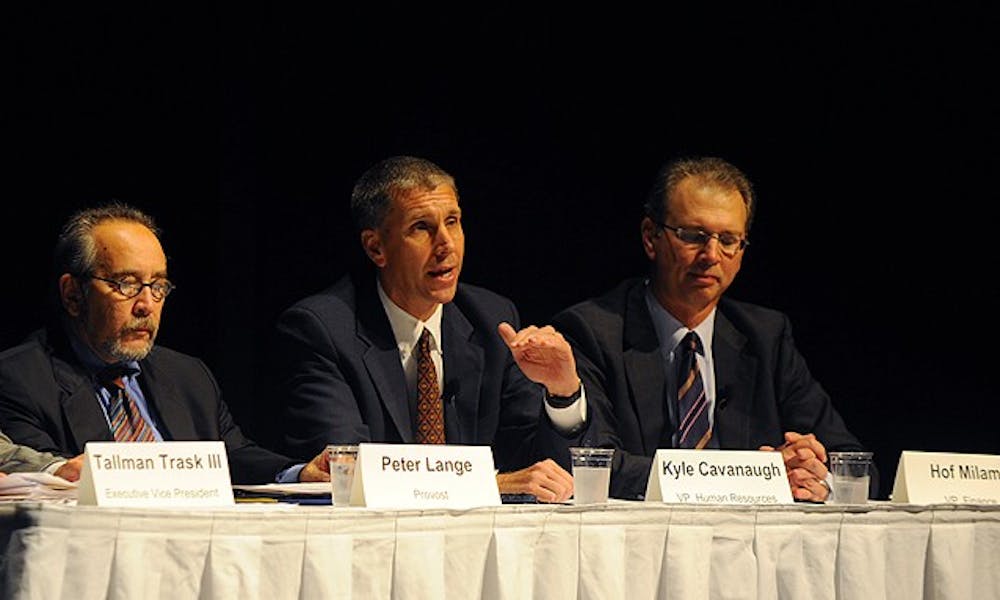Duke’s payroll will likely become slimmer still, after an announcement Thursday that the University will offer early retirement incentives to some salaried employees.
The latest retirements are a small step toward cutting the University’s budget by $125 million over three years.
About 100 salaried employees will be given the option to retire early starting in October, Vice President for Human Resources Kyle Cavanaugh announced at a Primetime Employee Forum called “The Duke Economy—A Year Later.” Cavanaugh estimated that 10 to 20 of them would choose to retire by a Dec. 31 deadline.
Executive Vice President Tallman Trask said in an interview that these retirees will save the University less than $5 million this year.
“It’s not huge,” he said, adding that the package aims to “offer a better alternative to people who may not have a better alternative if we can’t figure this out.”
Duke is “working aggressively” to avoid laying off employees, Cavanaugh said after announcing the new incentives at the Primetime forum in Reynolds Theater.
Cavanaugh, Trask, Vice President for Finance Hof Milam and Provost Peter Lange spoke at the forum in front of approximately 200 employees. At least 272 people watched the forum online.
Trask said the University has already reduced expenses by $15 to $20 million due to the early retirement of 295 workers this summer. These “voluntary separations” were part of the first early retirement incentives announced in April at “Primetime at Duke: Duke and the Economy” was offered to 825 bi-weekly employees.
But retirement incentives alone will not be enough.
Duke is working to close a projected deficit of $50 to $70 million in its fiscal year 2010 budget. The 2010 fiscal year runs from July 1, 2009 to June 30, 2010.
All together, Milam said the University should be able to cut about $25 million from its budget this year.
The year’s remaining deficit of $45 million will be covered by transition funding—up to $165 million in extra endowment spending that was authorized by the Board of Trustees in May, Milam said.
Trask said the fund has already helped make up for a $29 million deficit in the fiscal year 2009 budget. An annual report detailing that budget will be released in early October.
As auditors finish looking over the fiscal year 2009 budget, deans and vice presidents will be looking to encourage specific salaried employees to retire.
The new round of early retirement incentives will be offered to a handpicked group of about 100 salaried employees whose positions could be eliminated or restructured if they retire, Cavanaugh said.
To qualify for early retirement, the number of years the employee has worked at Duke and the employee’s age must add to 75, the “Rule of 75,” and the position must not be more than half-funded by a grant or contract, he added.
Cavanaugh said employees who are paid monthly, such as supervisors, professors and administrators, will be offered two weeks of pay for each year they have worked at Duke, up to 26 years. They can also participate in Duke’s retiree health insurance plan.
Employees who are paid bi-weekly and chose to retire over the summer received health care benefits and an increased monthly pension. Monthly employees’ retirement plans are financed by a combination of their personal contributions and those of the University.
Trask said about 40 percent of the first round of retirees were groundskeepers, custodians, housekeepers or food service workers, and another 69 did administrative work. Duke has hired people to fill 32 of the positions opened in the first round of early retirement, including athletic coaches and police officers.
“We had, as part of the biweekly retirement plan, a substantial reduction in the number of custodians and grounds people at Duke, and you will begin to see, unfortunately, the effect of those service reductions,” he said at Primetime.
Early retirement incentives are not the only way Duke is coping with lower donation totals and an endowment that Trask said had a June 30 value of just below $4 billion.
Lange said the University has been conducting “mini strategic-planning exercises” with schools to build their budgets around the professors they would like to hire and their other goals. Schools have been told to plan for a 10 percent revenue drop in their 2010 budgets, he added.
“It’s a rock-turning exercise,” Lange said in an interview. “You turn over a rock to see what’s underneath and sometimes you find things you don’t expect. We’re identifying areas for them where they might find potential savings.”
The schools are also developing programs that will create additional revenue, such as new masters degrees, he said.
The University has also cut travel and entertainment spending, and is keeping buildings at cooler temperatures in the winter and warmer levels in the summer, Trask said.
Cavanaugh said the University has saved about $2 million by decreasing overtime work opportunities. Trask said workers have not taken the reduction in overtime hours “particularly well.”
“I think people understand it is better than the alternatives,” he added.
Get The Chronicle straight to your inbox
Signup for our weekly newsletter. Cancel at any time.

